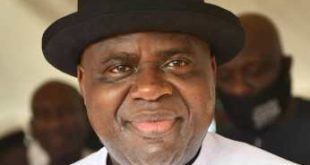By Joel Anekwe
As part of activities marking this year’s World Environment Day, the Environmental Rights Action/Friends of the Earth Nigeria ERA/FoEN has charged the Federal Government to establish a $100 billion clean-up and remediation fund for the cleanup of the entire Niger Delta to restore the environment and sustain rural livelihoods.
The environment advocacy group said the establishment of the fund would be a demonstration of the Federal Government’s seriousness on environmental protection.
In a press briefing in Port Harcourt Wednesday, on ‘Air Pollution and Energy Transition From Fossil Fuels to Renewable Energy Sources for Nigeria,’ Dr. Godwin Ojo, executive director, ERA/FoEN also demanded that the Federal Government should set a 2030 deadline for energy transition, which he described as inevitable in the long run.
“We encourage the Federal Government to dedicate a percentage of the national budget for research, development and production and supply of renewable energy systems to improve solar energy access that is currently low in Nigeria,” Ojo said, adding that government should “immediately divest public finance, loans and subsidies from fossil fuel exploitation and channel such resources to investment in renewable energy access for all.”
Explaining the reason behind the demand, Dr. Ojo said that Nigeria had committed herself to implementing the Paris Agreement of 2015 unconditionally, but lamented that “this is a country that has no policy on transition to renewable energy.”
As a way forward, he called for an “urgent decentralisation of energy production and supply system through an energy democracy transition model that allows communities and individuals to be co-producers of energy as well as suppliers and end users.”
This vision, according to him, can be achieved through mini-grid, feed-in tariffs, and off-grid systems to promote environmental sustainability and generate green jobs that are environmentally-friendly.
He challenged the Federal Government to be enough courageous “to ban diesel and petrol generator sets in the ministries, departments and agencies and use the funds to provide solar energy systems for offices. It (government) should also set a deadline to halt the importation and use of diesel and petrol cars and other means of transportation so that Nigeria will not be a dumping ground for obsolete cars from industrialised countries.”
Contending that Nigeria can survive without oil despite her heavy dependence on the resource for over 80 percent of its revenue receipts, the executive director ERA/FoEN said, “In spite of the estimated US$600 billion from oil revenue in the past decades, about 99 percent of Nigeria’s 200 million population remain in abject poverty, lacking basic social amenities and are victims of serious energy poverty.”
He added: “Nigeria’s oil dependence has led to the shrinking socio-economic opportunities arising from failure to diversify the economy from the oil sector to a return to agricultural boom and net exporter of food in the 1960s/70s. The oil and gas sector is also fueling corruption, massive environmental degradation and a weakening of environmental laws and non-compliance.”
On the nagging issue of the cleanup of the polluted Ogoniland, Dr. Ojo stated that in the past four years, the government scored near zero for its poor environmental protection record even though the clean-up of Ogoni has been touted as an environmental legacy project of the President Muhammad Buhari’ administration.
He explained: “First there is a lack of an acceptable key performance indicator for the clean-up. Although 16 contractors have been reportedly mobilised to site in December 2018, the key performance indicators has not been made public by HYPREP indicating a lack of transparency and accountability of process. The cleanup contract awards have been corrupted as political patronage for politicians to enrich themselves at the detriment of the poor impacted victims of the oil and gas pollution. Government should pay greater attention on this legacy project to properly cleanup Ogoni, restore public confidence and redeemed its dented image,” he stated.
His second reason is that “Nigeria lacks a holistic approach to environmental protection and sustainable development. It has failed to put in place a National Environmental Action Plan that will specify a framework of action to deliver on set national targets measured by clear indicators on an annual basis.
“Thirdly, the government continues to pay lip service to the cleanup of the Niger Delta. As part of civil society groups’ environmental agenda-setting, we demand that the Federal Government put in place a framework for cleanup of all polluted Niger Delta that has been the source of protests and violent conflicts.
“As a conflict resolution mechanism, the Federal Government should delineate the Niger Delta as ecological disaster area and declare environmental state of emergency to focus on the Niger Delta and gas flaring,” he said.
 PH Mundial – Port Harcourt Online Newspaper News Across The Region
PH Mundial – Port Harcourt Online Newspaper News Across The Region




